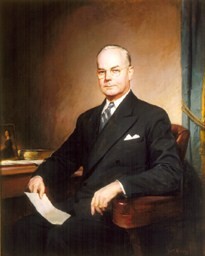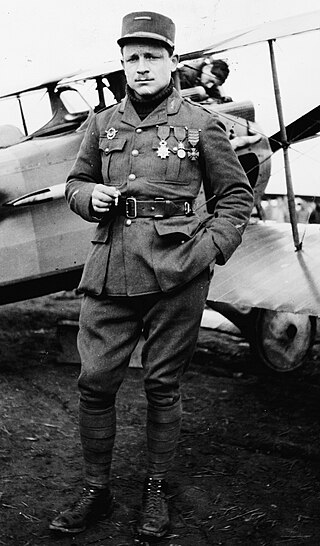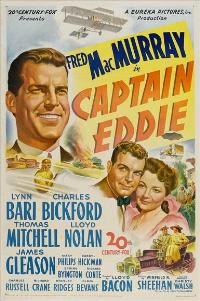Related Research Articles

Edward Vernon Rickenbacker was an American fighter pilot in World War I and a Medal of Honor recipient. With 26 aerial victories, he was the most successful and most decorated United States flying ace of the war. He was also a racing driver, an automotive designer, and a long-time head of Eastern Air Lines.

Frank Luke Jr. was an American fighter ace credited with 19 aerial victories, ranking him second among United States Army Air Service (USAAS) pilots during World War I, after Eddie Rickenbacker. Luke was the first airman to receive the Medal of Honor and first USAAS ace in a day. Luke Air Force Base, Arizona, a United States Air Force pilot training installation since World War II, is named in his honor.

John Wesley Powell was an American geologist, U.S. Army soldier, explorer of the American West, professor at Illinois Wesleyan University, and director of major scientific and cultural institutions. He is famous for his 1869 geographic expedition, a three-month river trip down the Green and Colorado rivers, including the first official U.S. government-sponsored passage through the Grand Canyon.

In the first Gulf of Sidra incident, 19 August 1981, two Libyan Su-22 Fitters fired upon two U.S. F-14 Tomcats and were subsequently shot down off the Libyan coast. Libya had claimed that the entire Gulf was their territory, at 32° 30′ N, with an exclusive 62-nautical-mile fishing zone, which Libyan leader Muammar Gaddafi asserted as "The Line of Death" in 1973. Two further incidents occurred in the area in 1986 and in 1989.

John Wesley Snyder was an American businessman and senior federal government official. Thanks to his close personal friendship with President Harry S. Truman, Snyder was appointed Secretary of the Treasury during the Truman administration. He was the first native-born Arkansan to hold a U.S. Cabinet post.

The mile high club is slang for people who have had sexual intercourse on board an aircraft during flight. While this usually refers to sexual acts in an airliner lavatory, a sexual act anywhere on a plane in flight would fit the term. The actual height of the aircraft at the time the act takes place is not relevant; sexual activity in a plane flying 10 feet off the ground would still qualify.

Gervais Raoul Victor Lufbery was a French and American fighter pilot and flying ace in World War I. Because he served in both the French Air Force, and later the United States Army Air Service in World War I, he is sometimes listed alternately as a French ace or as an American ace. Officially, all but one of his 17 combat victories came while flying in French units.
Adolph Rickenbacker (April 1, 1887 – March 21, 1976) was a Swiss-American production engineer and machinist who, together with George Beauchamp, created the first electric string instrument, and co-founded the Rickenbacker guitar company, also with Beauchamp.

Douglas Campbell was an American aviator and World War I flying ace. He was the first American aviator flying in an American-trained air unit to achieve the status of ace.

The 94th Fighter Squadron is a unit of the United States Air Force 1st Operations Group located at Joint Base Langley–Eustis, Virginia. The 94th is equipped with the F-22 Raptor.

Ace Drummond is a Universal Pictures 1936 film serial based on the comic strip "Ace Drummond" written by Captain Eddie Rickenbacker and drawn by Clayton Knight. The serial's cast features John King, Jean Rogers, Noah Beery Jr. and Jackie Morrow, with Lon Chaney Jr. in a supporting role.

Reed McKinley Chambers was a pioneer in the American Aviation industry, as a flying ace in World War I, as founder of an early airline, and as founder and chairman of America's first aviation insurance company.

Cataract Canyon is a 46-mile-long (74 km) canyon of the Colorado River located within Canyonlands National Park and Glen Canyon National Recreation Area in southern Utah. It begins at Colorado's confluence with the Green River, and its downstream terminus is the confluence with the Dirty Devil River. The lower half of the canyon is submerged beneath Lake Powell when the lake is at its normal high water elevation of 3,700 feet (1,100 m).
Ace of aces is an informal title for the top pilot in a branch of military service. It also may refer to:
The Exploration of the Colorado River and Its Canyons by John Wesley Powell is a classic of American exploration literature. It is about the Powell Geographic Expedition of 1869 which was the first trip down the Colorado River by boat, including the first trip through the Grand Canyon.

Major James Armand Meissner was a World War I flying ace credited with eight aerial victories and awarded two Distinguished Service Crosses.

Bogart Rogers was an American motion picture writer, producer, innovator, and a pursuit pilot and a flying ace in World War I with the Royal Air Force.

Captain Eddie is a 1945 American drama film directed by Lloyd Bacon, based on Seven Were Saved by "Eddie" Rickenbacker and Lt. James Whittaker's We Thought We Heard the Angels Sing. The film stars Fred MacMurray, Lynn Bari and Charles Bickford. Captain Eddie is a "biopic" of Rickenbacker, from his experiences as a flying ace during World War I to his later involvement as a pioneering figure in civil aviation, and his iconic status as a business leader who was often at odds with labour unions and the government.

John Colton Sumner (1840–1907) was an American explorer who took part in the Powell Geographic Expedition of 1869. An experienced marksman and boatman, he was chosen by John Wesley Powell to lead the first boat of the expedition. He eventually had a falling out with Powell over differences in personality, and was troubled through the rest of his life over the disappearance and deaths of three other men in the expedition. His remorse and resentment became so great that, in 1902, he castrated himself.
Samuel Kaye Jr. was an officer in the United States Army Air Service during the Great War. He scored four victories and three probables while flying with the 94th Aero Squadron.
References
- ↑ Ross, John F. "About John F. Ross". John F. Ross. Retrieved 27 August 2015.
- ↑ "John F. Ross | The Atlantic". thatlantic.com. Retrieved 2019-04-19.
- ↑ "John F. Ross | Penguin Random House". PenguinRandomhouse.com. Retrieved 2015-09-02.
- ↑ "John F. Ross | Smithsonian Magazine articles". Smithsonianmag.com.
- ↑ "NPR's On Point "The Promise and Mystery of the Grand Canyon". wbur.org. Retrieved 2019-04-19.
- ↑ "John F. Ross | Science Friday". sciencefriday.com. Retrieved 2019-04-19.
- ↑ "Panel Discussion on the World Wars". C-SPAN.org. Retrieved 2015-09-09.
- ↑ "John Batchelor Show | 99 years ago: Eddie Rickenbacker vs Harvard. John Ross, "Enduring Courage: Ace Pilot Eddie Rickenbacker and the Dawn of the Age of Speed"".
- ↑ "John F. Ross | Authors | Macmillan". Macmillan. Retrieved 2015-09-09.
- ↑ "John F. Ross: The Promise of the Grand Canyon | Amazon". Amazon.
- ↑ "Washington Post| 'The big personality and big contributions of John Wesley Powell'". The Washington Post .
- ↑ "TIME".
- ↑ "The National| 'Retracing an Explorer's Journey Down the Colorado River'".
- ↑ "John F. Ross: Enduring Courage | Amazon". Amazon.
- ↑ National Geographic Author Q&A. Archived from the original on May 28, 2014.
- ↑ Bering, Henrik. "Book Review: 'Enduring Courage' by John F. Ross". The Wall Street Journal. Retrieved 2 September 2015.
- ↑ Herman, Arthur. "Book Review: 'War on the Run' by John F. Ross". The Wall Street Journal.